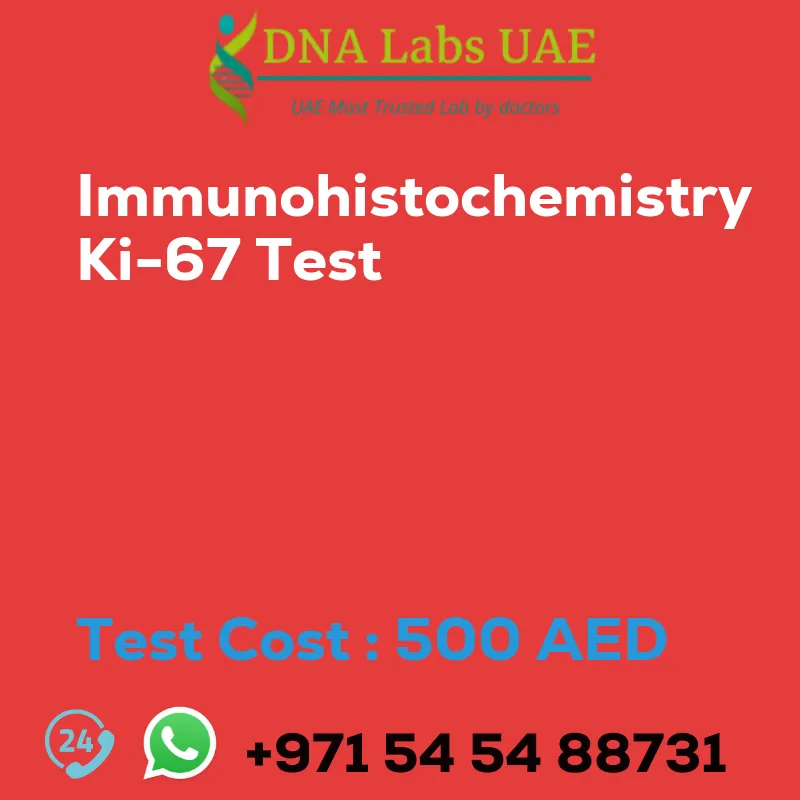IMMUNOHISTOCHEMISTRY Ki-67 Test
Test Name: IMMUNOHISTOCHEMISTRY Ki-67 Test
Components: Ki-67 protein
Price: 500.0 AED
Sample Condition: Submit tumor tissue in 10% Formal-saline OR Formalin fixed paraffin embedded block. Ship at room temperature. Provide a copy of the Histopathology report, Site of biopsy and Clinical history.
Report Delivery: Sample Daily by 6 pm; Report Block: 5 days Tissue Biopsy: 5 days Tissue large complex: 7 days
Method: Immunohistochemistry
Test Type: Cancer
Doctor: Oncologist, Pathologist
Test Department:
Pre Test Information: Provide a copy of the Histopathology report, Site of biopsy and Clinical history.
Test Details:
The Ki-67 test is an immunohistochemistry (IHC) test used to measure the level of Ki-67 protein in cells. Ki-67 is a nuclear protein that is expressed during active phases of the cell cycle, specifically in the G1, S, G2, and M phases. It is commonly used as a marker for cellular proliferation.
In the Ki-67 test, tissue samples are collected and processed into thin sections, which are then placed on slides. The slides are then treated with specific antibodies that bind to the Ki-67 protein. These antibodies are labeled with a dye or enzyme that produces a visible signal when the antibody binds to the protein.
After the antibody treatment, the slides are examined under a microscope, and the percentage of cells that are positive for Ki-67 staining is determined. This percentage, known as the Ki-67 labeling index, reflects the proportion of cells in the active phases of the cell cycle.
The Ki-67 test is commonly used in cancer research and clinical practice to assess the proliferation rate of tumor cells. It can provide important information about the aggressiveness of a tumor and help guide treatment decisions. High Ki-67 labeling index is often associated with a poorer prognosis and increased likelihood of tumor recurrence.
Overall, the Ki-67 test is a valuable tool in immunohistochemistry that provides insights into the proliferative activity of cells and can aid in the diagnosis and management of various diseases, particularly cancer.
| Test Name | IMMUNOHISTOCHEMISTRY Ki-67 Test |
|---|---|
| Components | |
| Price | 500.0 AED |
| Sample Condition | Submit tumor tissue in 10% Formal-saline OR Formalin fixed paraffin embedded block. Ship at room temperature. Provide a copy of the Histopathology report, Site of biopsy and Clinical history. |
| Report Delivery | Sample Daily by 6 pm; Report Block: 5 days Tissue Biopsy: 5 days Tissue large complex : 7 days |
| Method | Immunohistochemistry |
| Test type | Cancer |
| Doctor | Oncologist, Pathologist |
| Test Department: | |
| Pre Test Information | Provide a copy of the Histopathology report, Site of biopsy and Clinical history. |
| Test Details |
The Ki-67 test is an immunohistochemistry (IHC) test used to measure the level of Ki-67 protein in cells. Ki-67 is a nuclear protein that is expressed during active phases of the cell cycle, specifically in the G1, S, G2, and M phases. It is commonly used as a marker for cellular proliferation. In the Ki-67 test, tissue samples are collected and processed into thin sections, which are then placed on slides. The slides are then treated with specific antibodies that bind to the Ki-67 protein. These antibodies are labeled with a dye or enzyme that produces a visible signal when the antibody binds to the protein. After the antibody treatment, the slides are examined under a microscope, and the percentage of cells that are positive for Ki-67 staining is determined. This percentage, known as the Ki-67 labeling index, reflects the proportion of cells in the active phases of the cell cycle. The Ki-67 test is commonly used in cancer research and clinical practice to assess the proliferation rate of tumor cells. It can provide important information about the aggressiveness of a tumor and help guide treatment decisions. High Ki-67 labeling index is often associated with a poorer prognosis and increased likelihood of tumor recurrence. Overall, the Ki-67 test is a valuable tool in immunohistochemistry that provides insights into the proliferative activity of cells and can aid in the diagnosis and management of various diseases, particularly cancer. |








